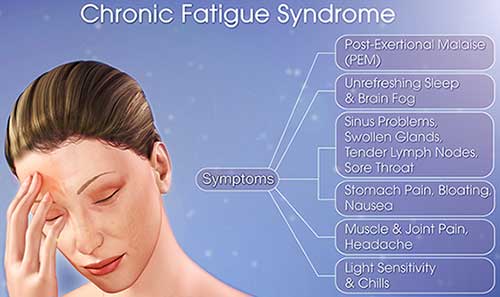FATIGUE IS A SYMPTOM

When your body perceives an infection, it wants to conserve all energy for the immune system to fight off the germs. Sensibly, you feel tired and want to rest when you’re sick. Chronic inflammation is typically a persistent low-grade activation of the immune system. These could be caused by a leaky gut, leading to food allergies or increased bacterial toxins in the blood. Many people with chronic inflammation also have some overgrowth of pathogens, but their immune system isn’t strong enough to fully get rid of the pathogens. In some cases, the immune system can fail to turn off even after the infections have cleared, causing ongoing fatigue. Like infections, the persistent immune activation can rob you of your energy and cause fatigue. Chronic inflammation - Your immune system uses some reactive oxygen species to kill germs.
Therefore, chronic inflammation can often raise oxidative stress. To make matters worse, many people are not consuming enough dietary antioxidants these days. Toxic exposure - When your liver detoxifies xenobiotics (foreign substances), it generates oxidative stress. Mental-emotional stress Lack of sleep Sedentary lifestyle High blood sugar can increase reactive oxygen species, which explains why diabetics are o.
Anemia or having insufficient red blood cells, including due to iron, folate, and B12 deficiencies Poor blood circulation due to blood vessel constrictions or hardening of the arteries Breathing too fast, too shallow, or hyperventilation, which can reduce oxygen transport into the brain 1 High caffeine consump.
Your thyroid hormones orchestrate energy production throughout the body. When your thyroid is sluggish, you’ll feel tired and every physiological process that requires energy slows down. Subclinical hypothyroidism could result from nutrient deficiencies, stress, inflammation, and yoyo dieting or insufficient calorie intake.
Circadian rhythm is your body’s recognition of day and night time that helps your body go to sleep at night. Modern lifestyle factors such as nighttime Stress Chronic stress can tire out your stress response system. It can also throw off sleep, increase inflammation, deplete nutrients, and throw off your hormones and gut. Nowadays, many people don’t have the tools to deal with their stressors healthily. Also, seemingly mundane things like the news and mobile devices can put your body into constant fight or flight mode. Stress will not completely go away. To get well and optimize your energy, it will be essential to respond to these stressors in a healthy way. Also, nutritional and adaptogen support can go a long way to mitigate the harmful effects of stress. blue light exposure, lack of daytime sun exposure, and late-night eating can derail the circadian rhythm and thus lower sleep quality. Sleep drive refers to molecules that build up in your body during the day, causing you to be tired at night. Then, as you sleep, your body processes these molecules, so you have the lowest levels of them in the morning. These molecules include inflammatory cytokines and oxidized glutathione, among others.
Therefore, abnormal levels or processing of inflammation or oxidative stress can affect sleep quality. Sleep interference and disruptors - Many people who suffer from fatigue are unaware of their sleep-disordered breathing, teeth grinding, or other factors that disrupt their sleep. In other cases, the sleep disruptors could be partners, children, or pets. Too little sleep or low sleep quality will leave enough inflamm.
Oxidative stress causes fatigue, so you may feel tired just because you don't consume enough antioxidants in your diet. As a result, when you introduce whole-food antioxidant supplements, you’ll feel significantly more energized. These whole-food supplements are also high in micronutrients that support energy production, such as B vitamins and nucleotides. Chlorophyll in greens may also boost mitochondria energy production.4 Because these antioxidants and nutrients are what your body needs rather than something that suppresses symptoms, you don’t develop tolerance to it. Also, unlike caffeine, you’ll feel steady energy without the crashes. It's critical to take these in whole-food forms, especially if you’re taking it long-term because they all work together in symphony. Adding too much of one can throw off the balances of others, which may cause more nutrient deficiencies or even diseases. The increased health risk from taking excessive nutrients in isolation have only been discovered in large-scale studies over many years. For example, synthetic vitamin E supplementation increases the risk of prostate cancers in healthy middle-aged men5, while supplementing with synthetic folic acid may increase the risk of some cancers.6 These risks are nonexistent when you get your nutrients from whole foods, both by eating nutritious foods and taking natural supplements.
All of our fermented plant-based supplements are high in antioxidants, especially the following :
Our supplements are fermented in order to increase the bioavailability of nutrients and plant-based antioxidants, and provide a source of postbiotics (beneficial bacteria metabolites). Many postbiotics, such as butyrate and acetate, can also support the mitochondria function. Balance immune response and heal the gut Chronic inflammation and autoimmunity are states of overactivated immune system, linked to intestinal permeability and dysbiosis. Because 80% of your immune system is in the gut, it will be important to heal the gut and correct dysbiosis to re-balance the immune system. Green Power provides a high quality source of fermented greens in combination with the friendly bacteria Lactobacillus reuteri.
B12 Power provides a fermented source of all forms of vitamin B12.
